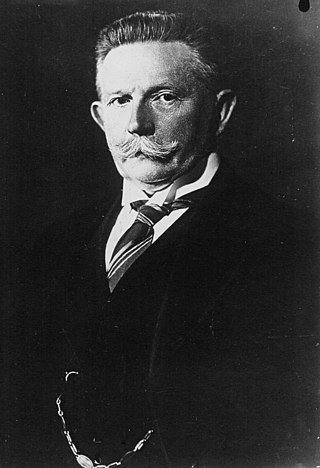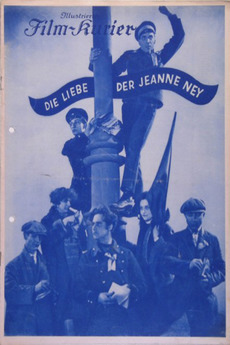Related Research Articles

The film industry in Germany can be traced back to the late 19th century. German cinema made major technical and artistic contributions to early film, broadcasting and television technology. Babelsberg became a household synonym for the early 20th century film industry in Europe, similar to Hollywood later.

Alfred Ernst Christian Alexander Hugenberg was an influential German businessman and politician. An important figure in nationalist politics in Germany for the first few decades of the twentieth century, Hugenberg became the country's leading media proprietor during the interwar period. As leader of the German National People's Party he was instrumental in helping Adolf Hitler become Chancellor of Germany and served in his first cabinet in 1933, hoping to control Hitler and use him as his "tool." Those plans backfired, and by the end of 1933 Hugenberg had been pushed to the sidelines. Although Hugenberg continued to serve as a "guest" member of the Reichstag until 1945, he wielded no political influence.
UFA GmbH, shortened to UFA, is a film and television production company that unites all production activities of the media conglomerate Bertelsmann in Germany. Its name derives from Universum-Film Aktiengesellschaft, a major German film company headquartered in Babelsberg, producing and distributing motion pictures from 1917 until the end of the Nazi era. The name UFA was revived by Bertelsmann for an otherwise unrelated film and television outfit, UFA GmbH.

Hugo Dieter Stinnes was a German industrialist and politician. During the late era of the German Empire and early Weimar Republic, he was considered to be one of the most influential entrepreneurs in Europe.

Faust – A German Folktale is a 1926 silent film produced by Ufa, directed by F. W. Murnau, starring Gösta Ekman as Faust, Emil Jannings as Mephisto, Camilla Horn as Gretchen/Marguerite, Frida Richard as her mother, Wilhelm Dieterle as her brother and Yvette Guilbert as Marthe Schwerdtlein, her aunt. Murnau's film draws on older traditions of the legendary tale of Faust as well as on Goethe's classic 1808 version. Ufa wanted Ludwig Berger to direct Faust, as Murnau was engaged with Variety; Murnau pressured the producer and, backed by Jannings, eventually persuaded Erich Pommer to let him direct the film.

The Blue Angel is a 1930 German musical comedy-drama film directed by Josef von Sternberg, and starring Marlene Dietrich, Emil Jannings and Kurt Gerron. Written by Carl Zuckmayer, Karl Vollmöller and Robert Liebmann – with uncredited contributions by Sternberg – it is based on Heinrich Mann's 1905 novel Professor Unrat and set in an unspecified northern German port city. The Blue Angel presents the tragic transformation of a respectable professor to a cabaret clown and his descent into madness. The film is the first feature-length German full-talkie and brought Dietrich international fame. In addition, it introduced her signature song, Friedrich Hollaender and Robert Liebmann's "Falling in Love Again ". It is considered to be a classic of German cinema.

Morgenrot is a 1933 German submarine film set during World War I.

Babelsberg Film Studio, located in Potsdam-Babelsberg outside Berlin, Germany, is the second oldest large-scale film studio in the world only preceded by the Danish Nordisk Film, producing films since 1912. With a total area of about 460,000 square metres (5,000,000 sq ft) and a studio area of about 25,000 square metres (270,000 sq ft) it is Europe's largest film studio.
Bavaria Film is a German film production and distribution company. It is one of Europe's largest film production companies, with some 30 subsidiaries.
The Tri-Ergon sound-on-film system was developed from around 1919 by three German inventors, Josef Engl (1893–1942), Joseph Massolle (1889–1957), and Hans Vogt (1890–1979).

Erich Pommer was a German-born film producer and executive. Pommer was perhaps the most powerful person in the German and European film industries in the 1920s and early 1930s.

Die Deutsche Wochenschau was the title of the unified newsreel series released in the cinemas of Nazi Germany from June 1940 until the end of World War II. The coordinated newsreel production was set up as a vital instrument for the mass distribution of Nazi propaganda at war. Today the preserved Wochenschau short films make up a significant part of the audiovisual records of the Nazi era.

The Love of Jeanne Ney, released as Lusts of the Flesh in the United Kingdom, is a 1927 German silent drama film directed by Georg Wilhelm Pabst based on a novel by Ilya Ehrenburg.
Jules Greenbaum was a German pioneering film producer. He founded the production companies Deutsche Bioscope, Deutsche Vitascope and Greenbaum-Film and was a dominant figure in German cinema in the years before the First World War. He is also known for his early experiments with sound films around twenty years before the success of The Jazz Singer made them a more established feature of cinema.

Tobis Film was a German film production and film distribution company. Founded in the late 1920s as a merger of several companies involved in the switch from silent to sound films, the organisation emerged as a leading German sound studio. Tobis used the Tri-Ergon sound-on-film system under the Tobis-Klang trade name. The UFA production company had separate rights to the Tobis system, which it used under the trade name of Ufa-Klang. Some Tobis films were released in Germany by the subsidiary Europa Film.
Phoebus Film or Phoebus-Film was a German film production and distribution company active during the silent era. It was one of the medium-sized firms established during the early boom years of the Weimar Republic. It had a distribution agreement with the American studio MGM.

The Weissensee Studios was a collection of separate film production studios located in the Berlin suburb of Weißensee during the silent era.
Decla-Film was a German film production and distribution company of the silent era, founded by Erich Pommer and Fritz Holz in February 1915.
Ufa Tonwoche was a German weekly newsreel program that ran from September 1925 until July 1940.
References
- ↑ Petley p.30-31